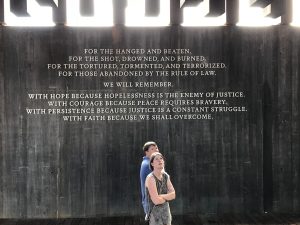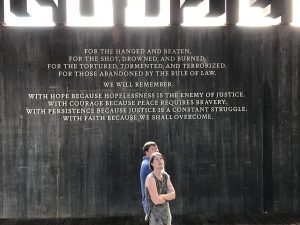
This week I ran into a man whose family has connections to Ukraine. They live in the country of Georgia now as Peg and I have been doing for the last five months where we are working with the Georgian judiciary. His perspective on Russia’s invasion of Ukraine is quite personal as is the perspective of the Russian man who sat next to me on a flight from Istanbul, Turkey to Batumi, Georgia last Wednesday.
The two men looked quite similar. Both were rather tall and athletically built and about 40 years of age. One man’s native language is English but the other speaks fluent Russian. His English created several entertaining exchanges for us that we worked through in mutual good humor. My Russian barely qualifies as communication even though Peg and I picked up some phrases when I was in Russia in 2003 working with the Russian judiciary.
I also managed to pick up a few Ukrainian words when I was in Ukraine in 2000 working with Ukrainian judges. I tried my Ukrainian lexicon with the man whose relatives speak Ukrainian, but it was more comic relief than communication.
Both men have children and both would like to see the war between Russia and Ukraine ended immediately if it can be done in a reasonable manner as each sees it. Peg and I are much more aligned with Ukraine than Russia, which the Russian obviously suspected when I told him at our mutual introduction Peg and I were Americans. He was initially rather cautious in his comments but once he decided I did not hold him responsible for Putin’s military decisions, he relaxed quite a bit. Unfortunately, our flight was only about two hours in length so he and I did not have time to bring Ukraine and Russia to the Peace Table.
He did share several deeply personal experiences and emotions with me during our short flight. When I told him our son had boxed at West Point and that I had helped train both amateur and professional boxers, he opened his mouth and showed me a set of perfect lower teeth. He said he had boxed in Russia and once got into the ring against a much larger boxer without wearing a mouthpiece. He had $3,000 worth of false teeth and a hard-earned lesson about uneven and unfair fights as a result.
The English speaker is a swimmer and an avid hiker who believes physical health is essential to mental health and both men do not hesitate to strongly state their views which are closely related to what kind of future their children may look forward to in a post Ukrainian-Russian war environment.
If the two fathers were to be placed together in a lineup, I would have a difficult time picking out which one was which. Both are about 6 feet tall and weigh about 200 pounds. Both have very short cropped, light colored hair and lean facial features. They could be brothers if looks were the only criteria.
They could, also, be brothers if their concerns for their families and their countries could be considered relevant DNA features. It struck me that both of them might be better choices for leaders of Ukraine and Russia than what we have, although this is purely my thought, as neither of them made such a suggestion. Of course, their natural national allegiances probably interfere somewhat with their ability to set aside any magnanimity. However, each of them recognized the children in the other country are not to blame; only the adults may be held accountable. That is, if the adults come to a realization they should be.
I shared with each man my concern that Russia might be of the same mind a friend of mine who was a supporter of Israel had in 1973 when Egypt could have overrun Israel with its superior, but non-nuclear, military power. At that time most experts believed Israel had stolen enough nuclear secrets from America to construct nuclear weapons. Now, we know they have.
Anyway, my friend stated his passionate support for Israel included Israel’s “right” to destroy the whole world if Egypt were about to destroy Israel. Such nihilistic blindness is what I and my new acquaintances most fear in our current war.








